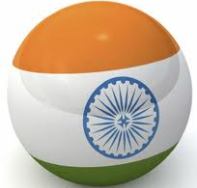On Jan 12th 2012, India has touched a milestone of being polio free for one whole year. The lone case of polio in 2011 was detected in a two year old girl in Panchla block of Howrah, West Bengal, with the onset of paralysis on 13th January 2011. India took a lead in introducing bivalent polio vaccine (bOPV) in January 2010. Despite global shortage of both bOPV and trivalent Polio vaccine, India tapped domestic market for timely supply of vaccine to ensure pulse polio rounds without interruptions. The prorgamme has been in the forefront of adopting technological innovations. The more efficacious monovalent oral polio vaccines were introduced in the Pulse Polio campaigns in 2005 which helped curtail the most dangerous type 1 polio strains to record low levels by 2009. In 2010 the bivalent oral polio vaccine was introduced which helped curtail both Type 1 and Type 3 polioviruses simultaneously and as efficaciously as the monovalent vaccines.
Share of Agriculture Sector in GDP
As per the estimates from Central Statistics Office (CSO), the share of agriculture and allied sector in GDP of the country has declined from 47.6% in 1960-61 to 14.4% in 2010-11 at 2004-05 prices. This is due to structural changes in the economy and more employment opportunities coming up in new areas.
Integrated Child Development Services (ICDS) Scheme
Launched in 1975, today, ICDS Scheme represents one of the world’s largest and most unique programmes for early childhood development. ICDS is the foremost symbol of India’s commitment to her children – India’s response to the challenge of providing pre-school education on one hand and breaking the vicious cycle of malnutrition, morbidity, reduced learning capacity and mortality, on the other.
Objectives of ICDS
The Integrated Child Development Services (ICDS) Scheme was launched in 1975 with the following objectives:
1. To improve the nutritional and health status of children in the age-group 0-6 years;
2. To lay the foundation for proper psychological, physical and social development of the child;
3. To reduce the incidence of mortality, morbidity, malnutrition and school dropout;
4. To achieve effective co-ordination of policy and implementation amongst the various departments to promote child development; and
5. To enhance the capability of the mother to look after the normal health and nutritional needs of the child through proper nutrition and health education.
Services
of ICDS
The above objectives are sought to be achieved through a package of services comprising:
Supplementary nutrition,
Immunization,
Health check-up,
Referral services,
Pre-school non-formal education and
Nutrition & health education.
QFIs Allowed to Directly Invest in Indian Equity Market
In a major policy decision, the Central Government has decided to allow Qualified Foreign Investors (QFIs) to directly invest in Indian equity market in order to widen the class of investors, attract more foreign funds, and reduce market volatility and to deepen the Indian capital market. QFIs have been already permitted to have direct access to Indian Mutual Funds schemes pursuant to the Budget announcement 2011-12. Today’s decision is a next logical step in the direction.
Qualified Foreign Investors
Qualified foreign investors, or QFIs, can be individuals, groups or associations based abroad who are allowed by the government to invest directly in mutual funds and stocks of Indian companies. Qualified Foreign Investors will be distinct from foreign portfolio investors and non-resident Indians. A QFI can, for instance, be a foreign individual investor in Singapore or Russia, who can buy into stocks of a Tata group company or Coal India or any other listed stock after fulfilling the Know Your Customer norms through an Indian depository participant and obtaining the approval of the RBI. The individual and aggregate investment limit for QFIs shall be 5% and 10% respectively of the paid up capital of Indian company.
Intranet Prahari Project Launched by Home Minister
All the BSF Jawans posted in 237 locations will now be able to access their personal data from wherever they are posted. This is a major benefit from the Intranet Prahari Projet apart from efficient office management which will help in quick decision making. This was stated by the Union Home Minister Sh. P. Chidambaram while launching Intranet Prahari Project.
Web Based Tagore Bibliography Launched by Pranab Mukherjee
To commemorate the 150th Birth Anniversary of Gurudev Rabindranath Tagore, the Ministry of Culture has undertaken several projects, schemes and events. One of the projects is compilation of a Web-bibliography of works of Tagore.
HUNGaMA (Hunger and Malnutrition) Report
The Prime Minister, Dr Manmohan Singh released the HUNGaMA (Hunger and Malnutrition) Report-2011 in New Delhi. "What concerns me and what must concern all enlightened citizens, is that 42% of our children are still underweight. This is an unacceptably high occurence. We have always believed that a mother’s education level, the economic status of the family, the provision of sanitation and hygiene, the status of women in the family, breastfeeding and other good child-rearing practices do affect children’s nutrition. The HUNGaMA survey has broadly validated these hypotheses."
India's Sovereign Credit Ratings- Fourth Upgrade by Moody's Investor Services
On 20th December, 2011, Moody`s Investor Services released a credit rating update for India. It upgraded the rating on long-term government bonds denominated in domestic currency from Bal to Baa3 (from speculative to investment grade). The long-term country ceiling on the foreign currency bank deposits was also upgraded from Bal to Baa3 (from speculative to investment grade). India`s sovereign debt is rated by six international sovereign credit rating agencies namely Standard and Poor`s (S&P), Moody`s Investors Service, Dominion Bond Rating Service (DBRS), Fitch Ratings, Japanese Credit Rating Agency (JCRA) and Rating and Investment Information (R&I). These agencies normally visit the Ministry of Finance and the Reserve Bank of India before making their credit assessment.






0 comments: